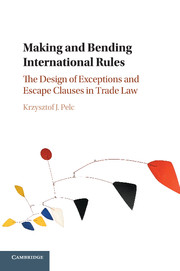Book contents
- Frontmatter
- Dedication
- Contents
- List of Tables
- Acknowledgments
- 1 The “Architectural Challenge” of International Rules
- 2 A Theory of the Design of Flexibility
- 3 A Brief Intellectual History of Flexibility in Law
- 4 The Twin GATT Exceptions: Fears and Solutions
- 5 The Evolving Design of Flexibility
- 6 The Bad News
- 7 The Good News
- 8 The Great Recession and Beyond
- Bibliography
- Index
1 - The “Architectural Challenge” of International Rules
Published online by Cambridge University Press: 05 September 2016
- Frontmatter
- Dedication
- Contents
- List of Tables
- Acknowledgments
- 1 The “Architectural Challenge” of International Rules
- 2 A Theory of the Design of Flexibility
- 3 A Brief Intellectual History of Flexibility in Law
- 4 The Twin GATT Exceptions: Fears and Solutions
- 5 The Evolving Design of Flexibility
- 6 The Bad News
- 7 The Good News
- 8 The Great Recession and Beyond
- Bibliography
- Index
Summary
“Boundless intemperance
In nature is a tyranny.”
— Macbeth, Act IVINTRODUCTION
Rules are undone by unexpected events. In the realm of international politics, droughts, floods, coups, wars, epidemics, price shocks, financial crises, and surges of imports are as many events that can upset the laws governing the behavior of states. There is broad agreement that in the midst of unexpected circumstances, the same rules that normally bind countries may need to be temporarily suspended, to allow governments to deal with exigency.
In fact, one of the constants running through all types of agreements is the inclusion of formal clauses that specify just how signatories will be allowed to break the very rules they have agreed on. Such escape clauses are prevalent in international trade, the regime this book examines most closely. But they are also found in the investment regime, the human rights regime, ancient Roman law, early canon law, religious rules of every stripe, and in the precepts of just war theory. Even absolute laws and moral rules recognize the need for their own suspension in some circumstances. These different sets of rules are a testament to the first paradox I examine in this book: rules become more effective by being imperfect. Entirely rigid agreements break apart at the first hurdle.
In the international realm, in particular, one would be hard pressed to think of a treaty that does not address uncertainty through the insertion of formal escape provisions of one form or another. In fact, the international treaty governing international treaties, the Vienna Convention on the Law of Treaties, includes a notorious flexibility clause addressing changes of circumstances.
In the Vienna Convention, as in other agreements, the inclusion of provisions that allow participants to legally breach an agreement's primary rules leads to a tricky theoretical question. We know that some measure of wiggle-room can be highly beneficial to treaties, to the point of becoming an essential condition for their existence. The ability to temporarily escape an agreement's obligations in hard times renders it less vulnerable to unforeseeable events. Flexibility allows for deeper commitments by the treaty's signatories, by providing a form of insurance that comes into effect if the costs of adjustment suddenly run too high. It also lowers barriers to entry, enlarging the membership, and with it, the gains from cooperation.
- Type
- Chapter
- Information
- Making and Bending International RulesThe Design of Exceptions and Escape Clauses in Trade Law, pp. 1 - 17Publisher: Cambridge University PressPrint publication year: 2016

